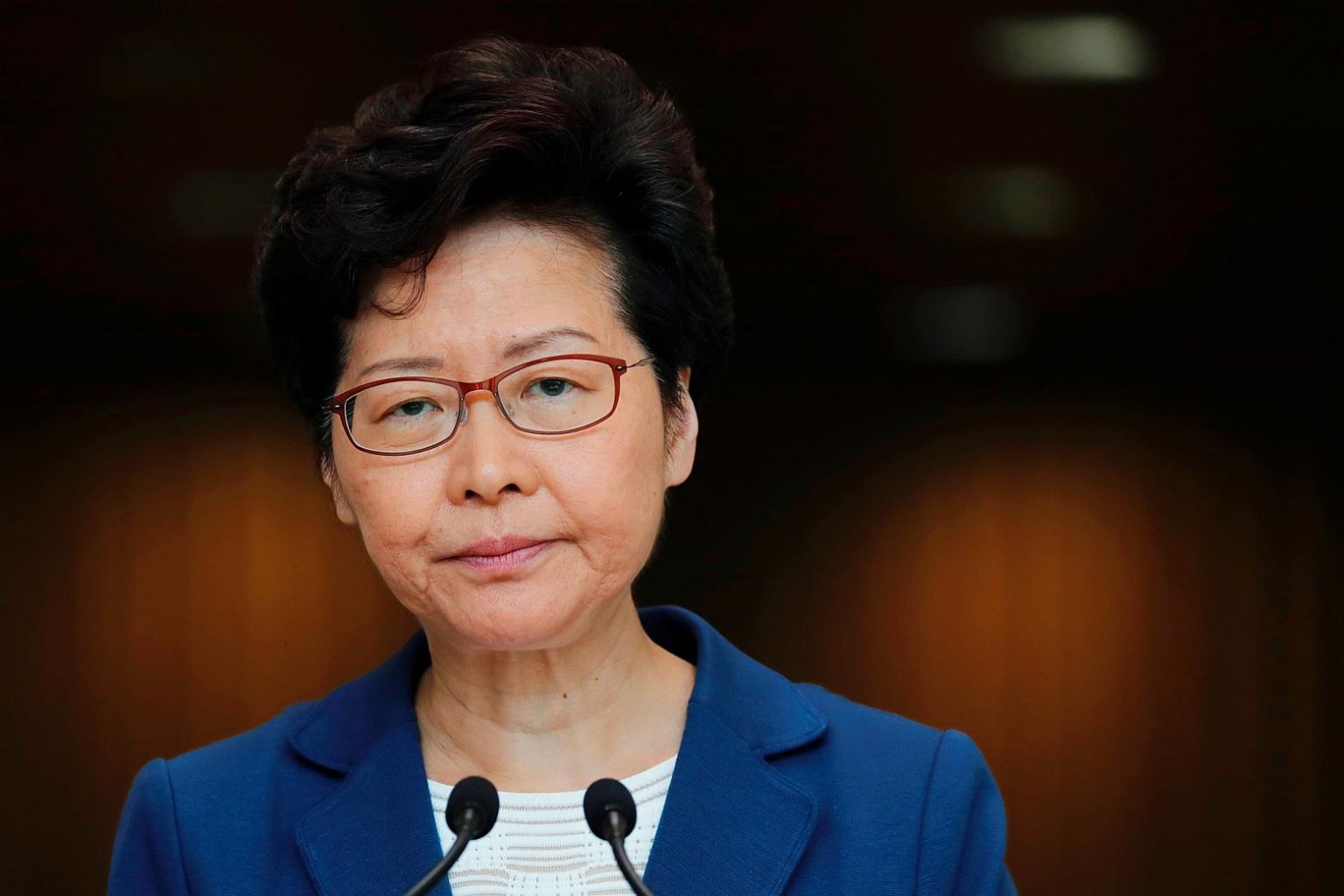Hong Kong leader Carrie Lam says no plans to use emergency powers for other laws, doesn’t rule out China intervention
Sign up now: Get insights on Asia's fast-moving developments

Chief Executive Carrie Lam at a news conference in Hong Kong on Oct 8, 2019.
PHOTO: REUTERS
Follow topic:
HONG KONG - The violence in Hong Kong has reached a state of lawlessness and the "rioters" are destroying the city, leader Carrie Lam said on Tuesday (Oct 8), adding that she would not rule out accepting help from mainland China in tackling the increasingly violent pro-democracy protests.
Still, she insisted that Hong Kong was equipped to handle the current situation on its own as the city braced itself for further demonstrations through the week.
Since a ban on the wearing of masks was announced last Friday (Oct 4), thousands have taken to the streets in protest, sometimes with acts of violence targeting metro stations, Chinese banks and Chinese-linked businesses.
"When rioters destroy malls and MTR stations, they call them dead things. But what they are doing is destroying Hong Kong," said the Chief Executive at a press conference ahead of the executive council meeting.
"These are all illegal acts that have sent Hong Kong into a very dangerous state, (the rioters) have no bottom line and are completely lawless."
But the events of the past few days are not a sign the ban is unsuccessful, she said, asking for time for the law to take effect.
Other than helping with law enforcement, she said the ban is meant to deter those who may feel emboldened by anonymity to break the law.
Mrs Lam last Friday invoked an emergency legislation to order the mask ban. But she denied any plans to use the emergency ordinance any further at this point.
On Monday evening, protesters took to the streets across the city in areas such as Mong Kok, Yuen Long, Tseung Kwan O and Sha Tin where they marched for the right to wear a mask in public.
Groups of protesters trashed a series of closed MTR stations around Sha Tin and targeting Chinese-owned businesses in a nearby shopping mall.
They also started fires in Tseung Kwan O and surrounded police stations in Prince Edward and Ma On Shan.
Separately, Legislative Council (LegCo) president Andrew Leung said it cost HK$40 million (S$7 million) to fix the damage to the Legislative Council building after protesters stormed and trashed the building on July 1, vandalising the legislative chamber.
The LegCo will reconvene on Oct 16, where Mrs Lam is also set to deliver a policy address.
On Tuesday, as schools and offices reopened after a public holiday weekend, rail operator MTR Corporation reopened most of its 93-station network, but said it would shut earlier at 8pm to facilitate repair works.
Thirteen metro and light rail stations remain shut; most of these are in the New Territories area and had been targeted on Monday night, when protesters pried open shutters, then took metal bars and hammers to ticketing machines, turnstiles and even CCTV cameras.
Long queues could be seen at bus stations early on Tuesday morning waiting for MTR's free connecting buses, with many in the queue students in uniform and office workers, local TV footage showed.
According to the South China Morning Post newspaper, there was an attack on a Hong Kong-Guangzhou train on Friday.
Footage has emerged of a black-clad crowd armed with hammers and metal bars smashing the platform of Fanling Station as an inter-city train approaches.
The mob then targets the train and as it pulls out of the station, tossing large rocks and a bicycle onto the track.
The service has since been restored.
Hong Kong has been rocked by nearly four months of unrest, with close to a million protesters taking to the streets against a contentious extradition Bill.
While the Bill has since been withdrawn, the movement has morphed into an anti-government one calling for more democracy.
Beijing has repeatedly accused "foreign forces" of driving the protests, which it calls a "colour revolution", saying that the unrest cannot go on indefinitely.
An item in Hong Kong's mini Constitution, the Basic Law, allows for it to call on Beijing's intervention should the local government deem itself unable to manage the city any longer.
The People's Liberation Army maintains a garrison in the city but it generally keeps a low profile.

